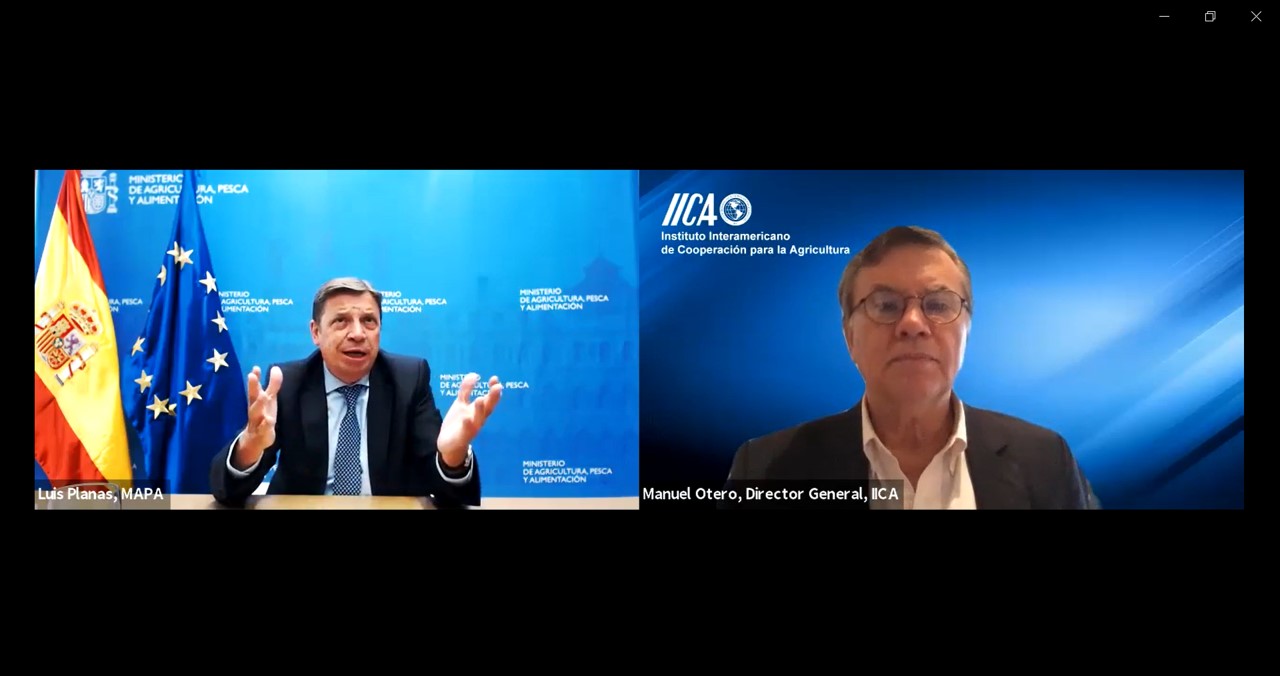The Minister of Agriculture, Fisheries and Food of Spain, Luis Planas, held discussions with the Director General of IICA, Manuel Otero, in which they explored areas of cooperation following the pandemic.

San Jose, 7 September 2020 (IICA). Agriculture is an indispensable sector for humanity, but it needs to aim for greater sustainability, broaden its digitalization and innovate both commercially and productively, all factors that will make it attractive to younger generations to dedicate themselves to the activity.
According to the Minister of Agriculture, Fisheries and Food of Spain (MAPA), Luis Planas, the current pandemic has provided greater recognition for the sector.
“Agriculture is not a passing fad. One can play with many things in life, but not with health or food. The population has a greater appreciation for the sector”, stated Planas in a high-level virtual discussion with Manuel Otero, Director General of the Inter-American Institute for Cooperation on Agriculture (IICA).
“We must produce sufficiently, both quantitatively and qualitatively, to feed a growing world population, but at the same time to do it in such a way as to not harm the only planet we have”, said the Minister.
“We need modernization; the possibilities are enormous, for irrigation, data use, and how to make mechanisms for irrigation, fertilization and phytosanitary control more effective. This is all aimed at having more natural, organic food, which is a trend among a lot of young people” added Planas.
The Minister agreed with the Director General of IICA that one of the biggest challenges facing the sector is how to attract the youth to agriculture. This requires more education as well as more digitalization and connectivity, – for example, crop control via satellite and drones – in order to make this activity more attractive and profitable for the younger generations.
“In Europe, we have more ageing societies than in other parts of the world. In Spain, 60% of the workers in the primary sector are 55 years old or older, which means that it is very likely that in 10 years, we will lose two-thirds of our farmers. What does that mean? An opportunity, a call for more women and youth to be involved in the rural sector”, added Planas.
With respect to technology and generational continuity, Manuel Otero offered the vision of Latin America and the Caribbean. “That region holds the key to rekindling the love affair between the youth and agriculture; if this does not happen, the problems we are experiencing could get worse. The Americas is a hemisphere with a demographic advantage that it must take advantage of. They are the future; without them agriculture will not evolve”.
Planas and Otero agreed to build a bridge, via IICA, that would create networks between professional youth in the Americas and Europe, for sharing knowledge and experiences through exchange programs and internships.
Other areas of cooperation
Other areas of horizontal cooperation foreseen by Minister Planas during the virtual discussion were agricultural insurance, efficient use of water, associativity and cooperativity, as well as strengthening the negotiating capabilities of the producers to obtain better prices.
“I have mentioned these four topics based on the situation in Latin America as I know it to be, and of the countries that are the most interested in cooperation in the agricultural and livestock community. We have a certain amount of experience and, through IICA, we could develop them”, stated the Minister.
With respect to agricultural insurance, Planas declared that he was “very much in favor” of this as it resolves a major portion of the uncertainties in agriculture and “can begin with small amounts, sectors or clusters, and grow further”. He made it clear that public-private partnerships are vital to drive it.
The Minister asserted that, with an efficient use of water, Spain was able to reduce its water consumption in the agriculture sector by 14%, and that this experience could be replicated in Latin America and the Caribbean, especially in light of the challenges posed by climate change.
“There are a lot of possibilities for synergy. Spain is the country with the largest irrigated surface area in the European Union with 3.8 million hectares, which is 22% of the agricultural lands in use at this time in the country; 52%, more than half, has been modernized for rational use”, he stated.
With respect to the negotiating capability of smallholder farmers with the industry to secure profitable and fair prices, Planas stated that Spain had adopted the reform of the Food Chain Act to increase transparency in price setting, an experience that could be replicated in the Americas.
“Farmers are usually the adjustment variable and they receive a residual price that often does not reflect the risks they take. If there are no fair prices, it will be difficult to keep them in their places of origin” noted the Director General of IICA, Manuel Otero.
Video in Spanish
More information:
Institutional Communication Division.
comunicacion.institucional@iica.int











